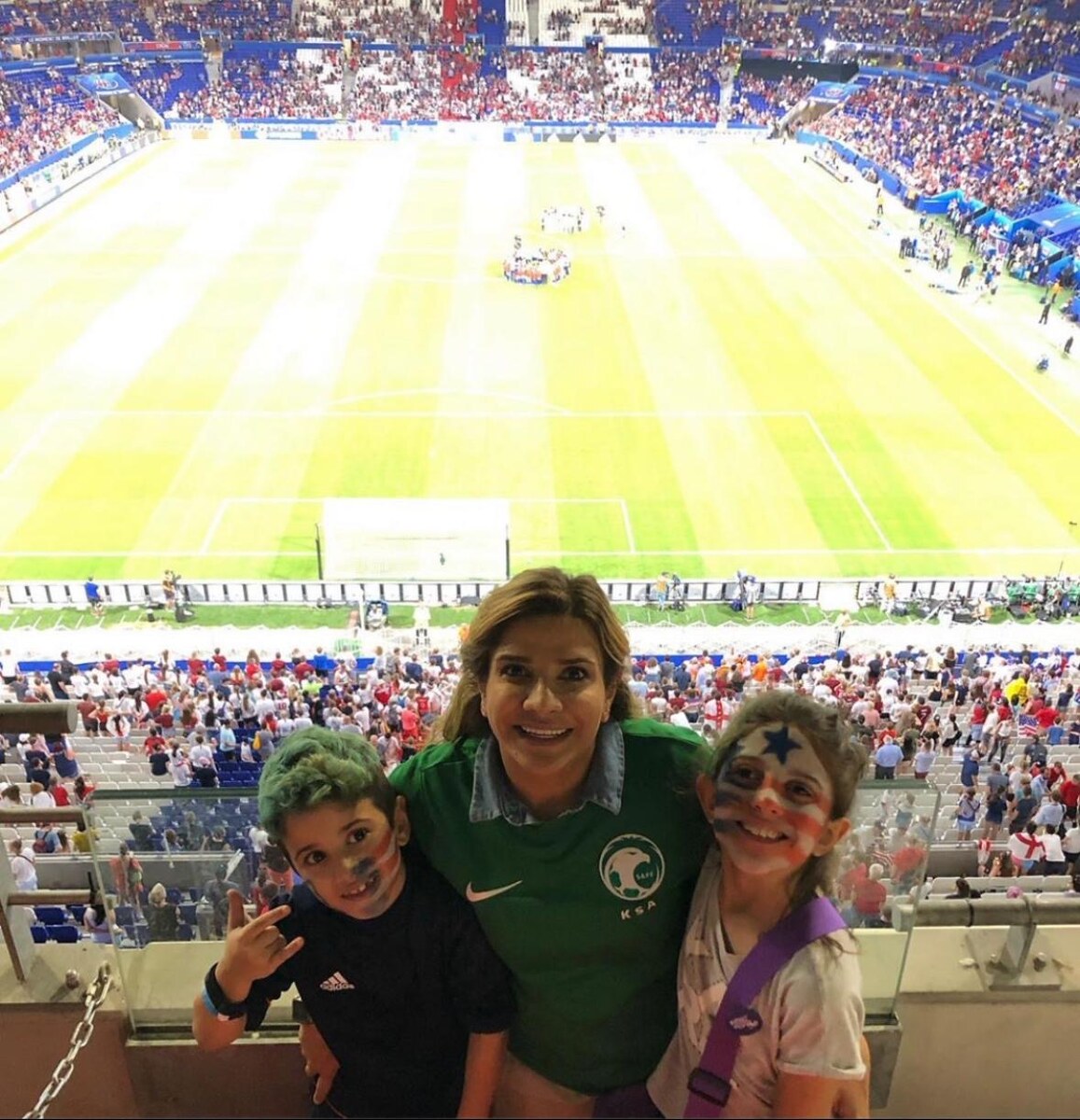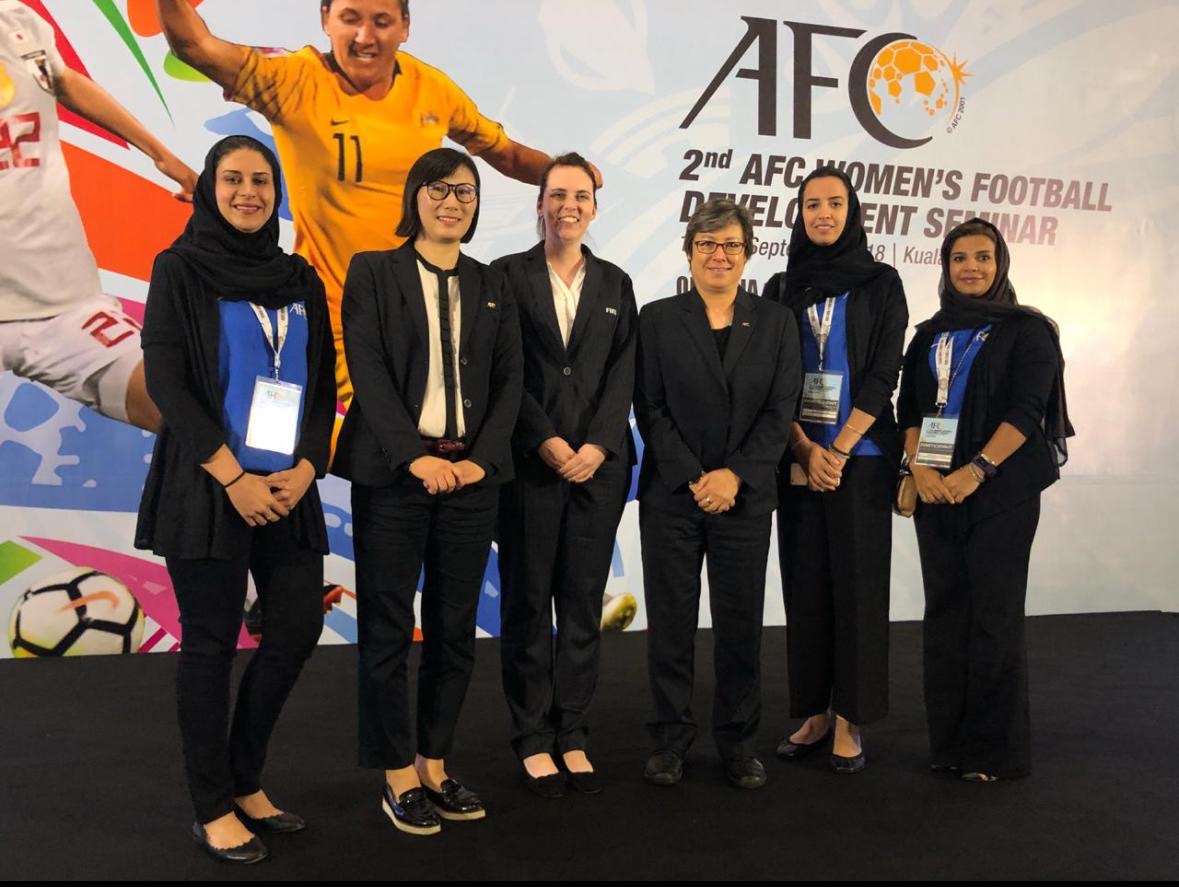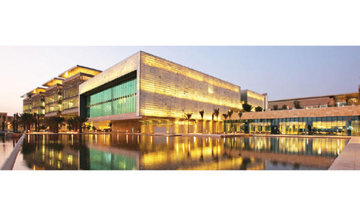DAMMAM: Maram Al-Butairi epitomizes grace under pressure. For the past 18 years, she has been at the helm of the Eastern Flames, the Kingdom’s first women’s football club, perfectly polished and always ready to play.
Since it was established in 2006, the pioneering club has competed at the highest levels in Saudi Arabia and the Gulf region, Al-Butairi, now the club’s owner and CEO, told Arab News.
“I have four teams: a first team, youth teams, and a futsal team with about 64 players — or I would call them sisters and daughters,” she said.
Al-Butairi was the first girl in her family after a string of male cousins, and immediately became their pride and joy. “That’s the meaning of my name, ‘Maram.’ Actually, it’s ‘your goal,’ the thing that you really want, that’s your Maram.”
As a young girl she loved football. And she was good at it, too, playing with her cousins and beating them. Her mother, an athlete who grew up in Kuwait, is a self-described “diehard football fanatic.”

Players learn how to accept defeat, and to bounce back after a minor fall or setback. (Supplied)
Soon enough, Al-Butairi found her own Maram.
“Football, like in any team sport, it teaches you a lot of values. The values that I care about the most, that I can teach my kids, is the Montessori way, which is to focus on loyalty, time management, because they need to manage their time,” she said.
After marrying, Al-Butairi moved to the US and studied finance at a private university, where she discovered that a number of students attended on athletic scholarships.
It got her thinking.
“Why don’t we have scholarships for athletes in Saudi Arabia?” she wondered. “I was there because the government supported me, but I thought, what if I have kids and the government support is no longer there?”
In 2006, she founded Eastern Flames, named after the Eastern Province, where she was raised. She started coaching when her daughter, now 15, began to play football.

Maram Al-Butairi got into coaching when her daughter, now 15, started to play football. (Supplied)
During the global pandemic, Al-Butairi returned to studying and earned her Master of Business Administration.
Today, she uses her business knowledge to help set young women players on the path to success.
By providing a livable wage in their contracts, she tries to provide them with a practical pathway to financial independence, as well as viable career options once they leave the sport.
On her platforms, she highlights how sports allow children to develop “soft skills,” such as learning how to listen to their bodies, remembering to eat well, and to be mindful of teammates and excel at time-management.
Players also learn how to accept defeat, and to bounce back after a minor fall or setback.
In 2024, the Kingdom offers the youth of the country ample opportunity to explore the full potential of the sport. And Al-Butairi is there for it all.

Players learn how to accept defeat, and to bounce back after a minor fall or setback. (Supplied)
“Note that I’m a businesswoman who decided to invest in sport a long time ago, and spent more than SR3 million ($800,200) last year to make sure that I can compete against the big clubs. This is not only passion, I am investing in the Saudi Arabian vision,” she said.
Arab News attended a recent friendly game between two opposing teams in Dammam. Before the match, Al-Butairi’s 13-year-old son Faisal stood watching.
“He’s not playing in my club because my club is women-only, but he’s here to support me,” his mother said, as the boy smiled.
“I’m proud of my mom, she’s doing something different,” he told Arab News.
While shouting encouragement to Eastern Flames players, Al-Butairi also spent her time on the sidelines jotting down observations in a small notebook to exchange later with the coach.
Her true joy, she said, was watching the players excel both on and off the pitch. Whether some go on to pursue the sport professionally was not her main concern. Instead, she wanted to ensure that everyone — spectators, coaches, players, potential players, and anyone watching on her Snapchat screen — had a good time.

Today, Maram Al-Butairi uses her business knowledge to help set young women players on the path to success. (Supplied)
“This is the difference between male and female football,” she said.
Women’s football prioritizes giving everyone a chance to play, and is not about gatekeeping or being focused on the final score as much as ensuring that everyone puts in their best effort, she added.
Al-Butairi’s excitement was obvious as she sipped coconut-infused water and gave out enthusiastic high-fives to everyone around her, from Eastern Flames players to the opposing team.
“I love it. I love all of it. Football is fun,” she said with a laugh.
“Eastern Flames was established in 2006, so 18 years ago, which is older than my kids. It’s my third baby,” she said.




























